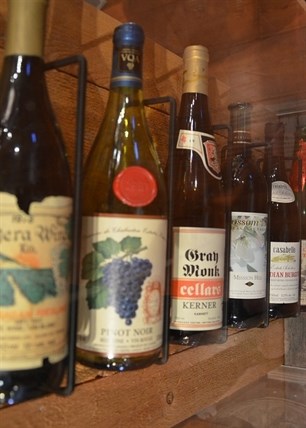
(JULIE WHITTET / iNFOnews.ca)
August 15, 2013 - 2:00 PM
KELOWNA – A tiny family of potent molecules might just be the reason to uncork a new bottle of wine tonight – for your health.
New research conducted by UBC Okanagan chemists has uncovered a variety of previously undetected molecules in wine believed to have life prolonging effects on its drinkers.
Associate Professor Cedric Saucier says his collaborative research project with graduate student Ryan Moss has shed some light on the powerful family of molecules known as stilbenoids.
“They are good for the health of grapes and for the health of humans,” Saucier says, containing a key chemical called resveratrol believed to prevent age-related sickness.
“They help protect the grape from fungal infection, acting as a natural defence.”
And now scientists are trying to pin down how those compounds influence human health – especially when trying to explain a phenomenon known as the French paradox.
“[The French] eat super fatty food with high levels of cholesterol, but are still four times less likely to get cardiovascular disease,” Saucier says, who himself comes from Bordeaux, France.
“People still don't understand why,” he says, but the current hypothesis credits the Mediterranean diet rich in vegetables, fish, omega 3 fatty acids, and of course, wine.
“The molecules are often cited as a good candidate to explain some protection against human chronic diseases that take time to develop," Saucier says, including Alzheimer's and cancer. The theory goes, if you eat and drink certain foods it can delay disease, much like a preventative medicine.
“Especially red wine, people consume it often there,” he says.
Is red wine actually healthier than white?
That's something Saucier and Moss hope to shed light on by doing more comparisons as their research continues.
“It's kind of true because red wine, the way it's made, you leave the skin and seeds,” he says. “More grape compounds are extracted in red wines,” and that means a greater concentration of the powerful stilbenoid molecules.
“I think we are going to find some of those in white wine, but likely lower,” he says.
And working in the Okanagan's wine country is the ideal place to find some answers. With funding from the B.C. Wine and Grape Council Saucier has already completed one study to measure the tannin content in wine. Tannins are molecules that affect both the taste and quality of a wine.
As Kelowna's wine industry blossoms, so to has the science of taste. Saucier, a pioneer in wine research, was the first to introduce wine enology courses at the university level in B.C.
The B.C. Wine Council didn't have any hand in the latest research findings, Saucier says, but expects they're watching closely.
He recalls a 60 Minutes documentary back in 1992 after that prompted a 30 per cent boost in wine sales.
“The new study is not funded by industry – but they will love it though!”
To contact the reporter for this story, email Julie Whittet at jwhittet@infotelnews.ca or call (250)718-0428.
News from © iNFOnews, 2013